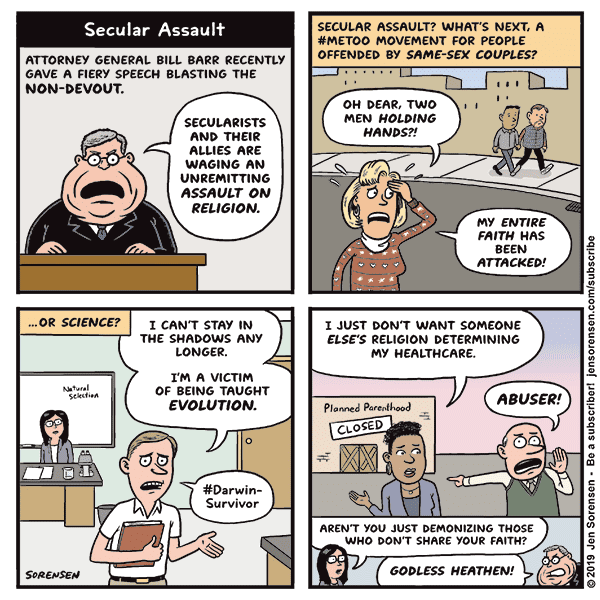
From time to time, I will receive an email from a former college acquaintance. I have yet to receive a letter from someone saying that they, too, lost their faith. As far as I know, I am the only out-and-proud atheist who attended Midwestern Baptist College. I am sure there are others, but I don’t know about them. Maybe they are closet atheists who must remain so due to their ongoing connection with Christianity through their families or other social connections. Or, perhaps, they don’t see the value in publicly outing themselves as atheists. If I gave a complete report of all I had to experience and endure since deconverting, closeted atheists would say, “See, look at Bruce Gerencser. Why would I subject myself to such abuse? No thanks!” This would especially be true for those who attended/graduated from Midwestern.
Midwestern, an Independent Fundamentalist Baptist (IFB) institution, had zero tolerance for deviance from the truths once to delivered allegedly by God to the late Tom Malone, the chancellor of the college and the pastor of the now-defunct Emmanuel Baptist Church. College administrators, professors, and dorm supervisors were expected to enforce the letter of the law, both doctrinally and practically. Violating these inviolable norms was considered a capital crime, resulting in expulsion from Midwestern. Fearing such an ignoble outcome, most students, at the very least, outwardly obeyed. I suspect being educated in such an environment leads to people being hesitant to oppose and reject religious and social norms — at least externally.
We know, however, that Christians can and do change over time, even if changes in theology and practice are not publicly expressed. What develops, then, is cognitive dissonance — the attempt to hold onto to competing truths/beliefs/ideas. None of us is exempt from cognitive dissonance. All we can do is skeptically, logically, and rationally examine our beliefs — our truth — and determine whether they deserve our continued support. But even then it is hard for Evangelicals, in particular, to publicly abandon previously held beliefs. The personal, social, communal, and economic costs for Evangelicals willing to talk out loud about their questions, doubts, or even loss of faith are often so severe that many people cannot bear the weight of that burden. This is especially so for clergymen.
In my case, in particular, I came from a sect that granted no quarter to dissenters. The anger and outrage over my deconversion continue to fuel attacks, almost twelve years later. I grossly underestimated how friends, family members, congregants, and ministerial colleagues would respond upon hearing of my divorce from Jesus. (Please read Dear Family, Friends, and Former Parishioners.) That’s why I later wrote the post, Count the Cost Before You Say I am an Atheist. I have written the above to say that I understand why other former Midwestern students, pastors, evangelists, missionaries, and pastors’ wives who have left the “one true faith” or may now be atheists keep their heresy and apostasy to themselves. However, personally, I have never been one to keep things to myself. That’s not just me. I don’t judge others who are not so inclined. I just wish I were granted the same courtesy. As readers shall see from the email I received below, some Evangelicals wish I would just shut up and move on.
This Midwestern graduate attended the college at the same time as Polly and I did. I believe he was a year or two ahead of us, married by the time we arrived at Midwestern in the Fall of 1976. My primary interaction with him was through college societies, social events, and religious activities. We were acquaintances, but not friends. With that background in mind, let me take a stab at responding to Roger’s questions.
I get it. Things went bad for you, the “lines didn’t fall out in pleasant places” for you. I can’t even imagine what you have been through based on some of your writings.
Roger does not give any context here, so I am not sure what he means when he says things went bad for me. All in all, I have pleasant and happy memories from my time at Midwestern and the twenty-five years I spent in the ministry. The same could be said for growing up in a dysfunctional home. Yes, lots of shit happened — bad stuff no child should ever have to experience — but on balance I had a pleasant upbringing. Certainly moving all the time, my mom’s repeated suicide attempts, poverty, and other stressors affected me psychologically. All of us are sum of our experiences. While I would not wish my past life on anyone else, I can say that some of the things I experienced made me a better person; things that fuel my passion as a writer to this day.
As a pastor, I met thousands of people. Many of them were kind, decent, loving people, and others still were Grade A assholes I wouldn’t give the time of day to if I came in contact with them to this day. That’s life, right? The difference between now and then is that as a pastor I felt duty-bound to love everyone unconditionally. As an atheist, no such compulsion drives me. I no longer willingly subject myself to be misused, abused, and used by people. Want to be my friend? Be a decent human being. If not, fuck off.
I have had my own struggles, most of which in my case were my fault. I am divorced and re-married, not in vocational ministry. I have been through church disciple, accountability, and restoration. In my case I have to blame the guy in the mirror.
Roger shares with me a bit of his own past experiences, some of which I have heard about via the Midwestern grapevine. I didn’t know Roger that well, so I made no judgment about what I had heard. I remember being disappointed over the failure of his marriage, but, again, since I really didn’t know him or his wife very well, I refrained from making a judgment.
One thing I have learned as an atheist is that it is probably best to not make hard and fast judgments about the marriages and families of others. “How well do we know anyone, even our spouses?” I remind myself. How can I, from the outside, render judgment on Roger’s past, his failed marriage, and his remarriage. I briefly looked at his Facebook profile. He “seemed” happy, devoted to his family. Over the past four weeks, I have been contacted by two former congregants, a former friend, and now, with Roger, a former collegemate. All but one of them took a negative tack with me, hoping that I might see the light and return to Christianity. (Please see Dear Greg.) The former friend who didn’t told me to call him sometime, so I am sure he is waiting for the right time to bring up my defection from Christianity. (And if not, he would be the first person not to do so.)
As with Roger, I looked up the Facebook profiles of the people who contacted me. Everyone, again, “seemed” happy, and since I only know them from a distance, I am content to accept their social media presentations as accurate description of their lives. It doesn’t really matter, does it? We are never going to become friends again. Our common bond rests in our shared past history. Since I know it is impossible for Evangelicals to accept me as I am, attempting to re-connect with them is a waste of time.
Roger didn’t email me because he wanted to reconnect with an old school buddy. We were never close to start with. If Wendell Uhl, Bill Duttry, Mike Lavery, Tim Rettger, Mark Bullock, or Bill Kuiper — all dormmates, friends, of mine — emailed me and said, “Hey Bruce, I’m traveling through your part of Ohio and I would sure love to share lunch with you and Polly” I would probably say yes. We have shared intimate history. I don’t have that kind of history with Roger.
Instead, Roger has a passive-aggressive point to make: that his life was a mess too, and most of it was his fault. Translation: Bruce, your life was/is a mess, and it’s your fault. If only I would own my past culpability and mistakes, I could then be set free from the path I am on. I am not sure how much of my blog Roger has actually read, but I think I can safely say that I have done a pretty good job at owning my past. What bothers many of the people who knew me as a pastor, friend, collegemate, or colleague in the ministry is that I am willing to publicly talk about these things. As you will see in a moment, Roger wants me to shut up and move on. Admit my culpability and turn the page.
So here is my sincere question. If you are a humanist, and dedicated to bettering the human race we all live in, why the disparaging remarks about churches, pastors, ministries, etc? Why not let it go and move onto positive things. As you have documented there are some real jerks and insincere people in ministry. Some not so, but I get it.
Part of bettering the human race is exposing how certain expressions of religious faith cause psychological harm, and can, in some instances, cause physical harm. The IFB church movement is a cult. And quite frankly, so is much of Evangelical Christianity. Am I not helping people by exposing these religions and their promoters for who and what they are? Wouldn’t people be better off if they were free from the pernicious mind-numbing hold of Fundamentalist preachers and churches? Countless Evangelical/IFB pastors and congregants have been helped by my writing. I know this because they write to tell me how much my work has meant to them. It is surely a good day when someone reads my writing and decides to walk away from Christian Fundamentalism. My goal has never been to be an evangelist for atheism. If something I write helps people move on to kinder, gentler, more inclusive expression of faith, mission accomplished.
Sadly, Roger’s email reflects a common belief among Evangelicals. Sure, pastors, churches, and ministries do bad things at times, but why point those things out? Move on, and let God sort things out. Here’s the thing: there is no God, so it is impossible for him to sort things out. Thus, it is left up to us, the only gods who walk on the face of earth, to do the sorting. As long as Evangelical churches, pastors, and institutions harm others, I intend I speak out.
Why not let all the garbage go and work at improving life for those in your sphere?
What Roger calls garbage, I call harm that pastors, evangelists, missionaries, churches, and colleges cause those who come under their care. Vile things have been done in the name of the Evangelical God and the “cause” of Christ. How can anyone stay silent and move on? The waiting rooms of psychiatrists, psychologists, and counselors are filled with patients materially damaged, harmed, and scarred by Fundamentalist religious ideology. Every year, people kill themselves over the harm done to them by so-called “men of God.” Am I not improving the lives of such people if I am willing to openly and honestly talk about my IFB upbringing and the twenty-five years I spent pastoring Evangelical churches? Believe me, thousands of readers appreciate the fact I understand where they are coming from. My writing validates their own experiences. And therein lies the problem. I am not someone who can be easily dismissed. First, I refuse to go away. Second, I know Evangelical Christianity in general, and the IFB church movement specifically, inside and outside. “I know,” as the mob hitman would say, “where the bodies are buried.” Third, most of the time, I enjoy my work. Doesn’t pay well, but sure has wonderful benefits — helping free people from religious bondage.
That said, writing for this blog is a small part of my life. I have a wife, six grown children, and thirteen grandchildren. Yes, thirteen. Our newest grandson, Silas, was born two weeks ago. That’s likely it for us. Time to move on to the great-grandchildren phase of life. As long-time readers know, I am a family guy. I wasn’t always this way. It took losing my faith to learn what really mattered to me. It is family that gives my life breath to breathe and reason to get up in the morning and painfully face another day. Sure, writing is important to me, but I’d never write another word if forced to choose between this blog and family. Spring and summer will soon arrive, and I plan on spending as much time as I can going to my grandkids’ ballgames, attending sporting events with my sons, enjoying family picnics, wining and dining my girlfriend, and taking road trips — all with camera in hand.
Roger ends his email by saying, “I hope you have a good day. I am genuinely sorry about your health issues. I have good memories of our time at MBC.” I indeed hope I have a good day, and I wish the same for Roger and his family. I appreciate his sympathy for my health problems. I too, have fond memories of Midwestern Baptist College, many of which I have shared on the pages of this blog. The difference between us is that I am willing to honestly and openly talk about the not-so-fond memories; the dark, harmful memories I have too. I want the telling of my life to be one of truth, all of it, and not just the parts that cast me (or others) in a favorable light. I leave it to others to judge the sum of my life.
About Bruce Gerencser
Bruce Gerencser, 62, lives in rural Northwest Ohio with his wife of 41 years. He and his wife have six grown children and twelve grandchildren. Bruce pastored Evangelical churches for twenty-five years in Ohio, Texas, and Michigan. Bruce left the ministry in 2005, and in 2008 he left Christianity. Bruce is now a humanist and an atheist. For more information about Bruce, please read the About page.
Are you on Social Media?
Follow Bruce on Facebook and Twitter.
Thank you for reading this post. Please share your thoughts in the comment section. If you are a first-time commenter, please read the commenting policy before wowing readers with your words. All first-time comments are moderated. If you would like to contact Bruce directly, please use the contact form to do so.
Donations are always appreciated. Donations on a monthly basis can be made through Patreon. One-time donations can be made through PayPal.










